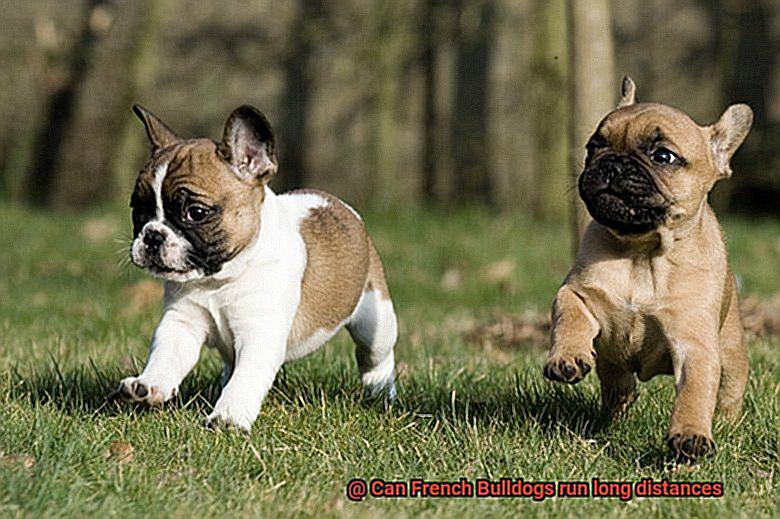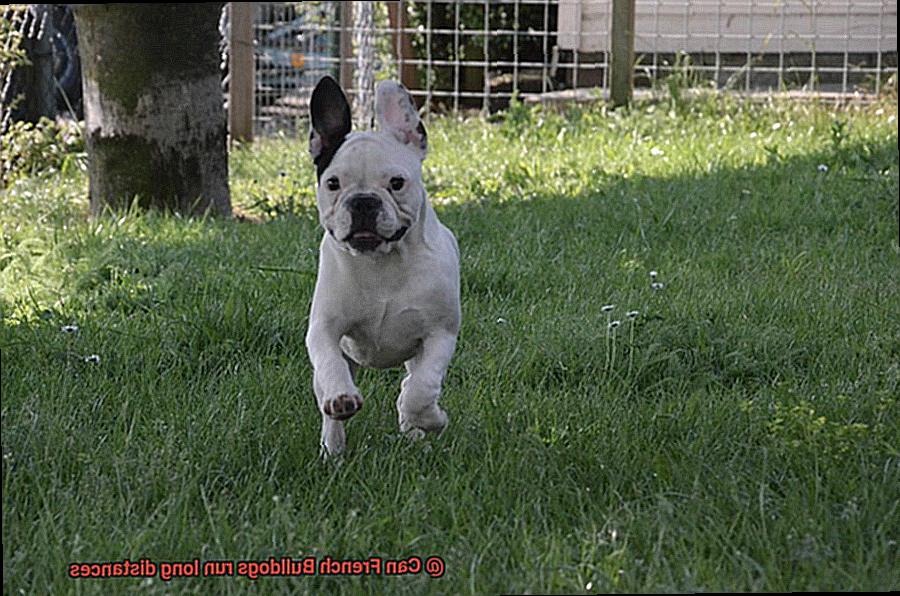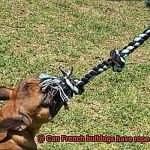Can French Bulldogs run long distances?
Picture this: a French Bulldog, with its irresistible charm and mischievous eyes, trotting alongside you on a long-distance run. Sounds like the perfect Instagram moment, right? But before you lace up your running shoes and hit the pavement, let’s dive into the question that has dog lovers everywhere scratching their heads: can French Bulldogs actually run long distances?
French Bulldogs have stolen the hearts of millions with their compact size and friendly nature. They’re the ideal companions for city dwellers looking for a furry sidekick. But beneath their adorable exterior lies a breed with some unique physical traits that might put a damper on their marathon dreams.
With their short snouts and brachycephalic faces, French Bulldogs are no strangers to breathing difficulties. When it gets hot or they’re engaged in intense exercise, these little guys can struggle to catch their breath. It’s like trying to sprint while breathing through a straw. And let’s not forget about their stocky build – it doesn’t exactly scream “marathon runner.”
But don’t count them out just yet. Despite these challenges, French Bulldogs have surprises up their paws. While they may not break any land speed records or win any medals for endurance, they do possess an undeniable enthusiasm for physical activity. Think of them as sprinters rather than marathoners – they excel in short bursts of energy that can leave you breathless (and smiling).
Research even shows that French Bulldogs have a higher percentage of ‘fast-twitch’ muscle fibers – those responsible for explosive bursts of energy. So while they may not be able to go the distance, they’ll dazzle you with their agility and quickness during those shorter bouts of playtime.
Of course, it’s important to remember that every French Bulldog is as unique as we are. Some pups might surprise you with their stamina and cardiovascular fitness, while others might prefer to take it easy. Factors like age, weight, overall health, and conditioning all play a role in determining how far your French Bulldog can go.
Before you embark on that long-distance adventure with your furry friend, make sure to consult with a trusted veterinarian.
They’ll be able to assess your French Bulldog’s specific health condition, recommend an appropriate training plan, and help you determine what distances are suitable for your four-legged companion.
The Challenges of Long-Distance Running for French Bulldogs
Contents
- 1 The Challenges of Long-Distance Running for French Bulldogs
- 2 Understanding the Brachycephalic Nature of French Bulldogs
- 3 Low-Impact Exercise Alternatives for French Bulldogs
- 4 Factors to Consider When Exercising a French Bulldog
- 5 How Much Exercise is Appropriate for a French Bulldog?
- 6 Tips for Ensuring Your French Bulldog’s Safety During Exercise
- 7 Signs of Fatigue, Overheating, or Discomfort in French Bulldogs
- 8 Conclusion
French Bulldogs are beloved companions known for their adorable appearance and affectionate nature. While they may not be natural long-distance runners, it’s essential to understand the challenges they face when engaging in high-intensity exercise like long-distance running.
In this article, we will explore the unique factors that make long-distance running difficult for French Bulldogs and discuss alternative exercise options to keep them healthy and happy.
Brachycephalic Anatomy:
French Bulldogs have a distinct brachycephalic anatomy, characterized by a shorter snout and flattened face. This anatomy can lead to breathing difficulties, especially during strenuous activities like long-distance running.
Their airways are narrower, making it harder for them to cool down efficiently and breathe properly.

Overheating and Heatstroke:
Due to their compact size and muscular build, French Bulldogs have a higher risk of overheating during intense physical activity. Their brachycephalic nature makes it challenging for them to regulate their body temperature effectively.
This puts them at risk of heatstroke, which can be life-threatening. It’s vital to monitor their activity levels closely and provide ample rest and water breaks to prevent overheating.
Physical Structure:
French Bulldogs may struggle with the physical demands of long-distance running due to their short legs and compact bodies. Their physique is better suited for short bursts of energy rather than prolonged periods of high-intensity exercise.
Running long distances can strain their muscles and joints, increasing the risk of injury.
Fitness Levels:

Compared to breeds built for endurance and stamina, French Bulldogs are generally not as physically fit. Their bodies are designed for moderate exercise rather than prolonged activity.
It’s important to gradually increase their endurance through regular exercise and avoid pushing them beyond their physical limitations.
Fatigue and Injury:
French Bulldogs have a tendency to become easily fatigued. Running long distances without proper conditioning can put excessive strain on their muscles and joints, increasing the risk of injuries such as sprains or strains. It’s crucial to pay attention to their body language and behavior during exercise and adjust accordingly to prevent exhaustion and injury.
Understanding the Brachycephalic Nature of French Bulldogs
It is important to understand that these furry friends have a brachycephalic nature, which can affect their ability to engage in strenuous exercise.
In this section, we will delve into the specifics of their brachycephalic anatomy and explore how it impacts their exercise capabilities.
So, grab your favorite pup and let’s embark on this informative journey together.
The Brachycephalic Anatomy:
French Bulldogs possess a unique physical characteristic – a short and pushed-in nose accompanied by a flat face.
This adorable feature is what classifies them as brachycephalic breeds. Unfortunately, this endearing trait can also present challenges when it comes to vigorous physical activities.
Respiratory Issues and Overheating:
Brachycephalic breeds, including French Bulldogs, are prone to respiratory issues due to their shortened airways and narrowed nostrils. These structural abnormalities make it difficult for them to breathe efficiently, especially during intense exercise.
Additionally, their inability to cool down effectively through panting puts them at a higher risk of overheating and exhaustion.
The Importance of Tailored Exercise:
While some French Bulldogs may exhibit energy and enthusiasm for running, it is crucial to consider their individual health and physical limitations before engaging in strenuous exercise. Regular exercise is still essential for maintaining their overall well-being; however, it must be tailored to suit their specific needs.
Recommended Exercise Options:
- Short walks: Enjoy leisurely strolls around the neighborhood or local parks. This low-impact activity allows your French Bulldog to stay active without putting excessive strain on their respiratory system.
- Play sessions: Engage in interactive play sessions that involve mentally stimulating toys or games. This not only keeps them physically active but also provides mental enrichment.
- Mental stimulation exercises: French Bulldogs are intelligent dogs that thrive on mental challenges. Incorporate puzzle toys, obedience training, or scent games to keep their minds sharp and engaged.
Consulting Professionals:
To ensure the best exercise regimen for your French Bulldog, it is always recommended to consult with a veterinarian or a professional dog trainer experienced in working with brachycephalic breeds. They can assess your dog’s individual needs and provide tailored recommendations for exercise.
Listening to Your Frenchie:
While it’s important to encourage physical activity, paying attention to your French Bulldog’s cues during exercise is crucial. Watch for signs of fatigue or distress, such as difficulty breathing, excessive panting, or extreme exhaustion. If any of these signs manifest, stop the activity immediately and provide them with rest and plenty of water.
Low-Impact Exercise Alternatives for French Bulldogs
French Bulldogs, with their cute squished faces and unique physical characteristics, require special consideration when it comes to exercise. Their short noses make them prone to respiratory issues and overheating, so it’s important to find low-impact exercise alternatives that keep them healthy and happy without putting too much strain on their bodies.
Before starting any exercise routine for your French Bulldog, it is crucial to consult with a veterinarian. They can provide guidance based on your dog’s specific health needs and limitations. Your vet will be able to assess your Frenchie’s overall health and determine what types of activities are safe and appropriate.
Walking: The Classic Low-Impact Exercise
One of the best low-impact exercises for French Bulldogs is walking. Daily walks not only provide physical activity but also mental stimulation. They help burn calories, strengthen muscles, and improve cardiovascular health. When taking your Frenchie for a walk, make sure to use a harness instead of a collar to avoid putting pressure on their delicate necks.
Swimming: A Refreshing Workout
Swimming is another excellent low-impact exercise option for French Bulldogs. It provides a full-body workout without putting stress on their joints. However, it is essential to introduce your Frenchie to water gradually and ensure proper supervision and safety measures are in place. Not all French Bulldogs are natural swimmers, so take it slow and monitor their comfort level.
Puzzle Toys and Interactive Games: Mental Stimulation Matters
In addition to physical exercise, mental stimulation is crucial for French Bulldogs. Puzzle toys and interactive games can keep them engaged and active without excessive physical exertion. These activities challenge their minds, prevent boredom, and promote problem-solving skills. Look for puzzle toys that are specifically designed for dogs and provide mental enrichment.
Short Play Sessions: Fun with Interactive Toys
Short play sessions with interactive toys like balls or frisbees can be a great way to engage your Frenchie in a moderate level of physical activity without straining their bodies. These short bursts of exercise are ideal for French Bulldogs and help them burn energy while having fun. Just make sure to choose toys that are appropriate for their size and avoid activities that require excessive jumping or running.
Listening to Your Frenchie’s Cues
While engaging in low-impact exercises, it is essential to closely monitor your French Bulldog for any signs of distress or discomfort. Watch for excessive panting, labored breathing, or reluctance to continue the activity. If you notice any of these signs, it’s important to stop the exercise immediately and consult with your veterinarian.
Factors to Consider When Exercising a French Bulldog
However, their unique physical attributes require careful consideration when it comes to exercise. In this blog post, we will discuss the factors you need to consider when exercising your French Bulldog to ensure their well-being and happiness.
Brachycephalic breed:
French Bulldogs have a cute, pushed-in face that makes them undeniably adorable. However, this anatomical feature also means they have a shortened skull, which can make breathing difficult during strenuous exercise. It is vital to adjust their exercise routine to accommodate their limited breathing capacity. Avoid activities that may cause them to pant excessively or become winded.
Heat sensitivity:
French Bulldogs are more prone to heat exhaustion and heatstroke due to their compromised respiratory system. Take extra precautions when exercising them in hot and humid conditions. Opt for cooler times of the day, such as early mornings or evenings. Always carry water with you and provide frequent breaks for your furry friend to hydrate and cool down.
Joint health:
Like many small breeds, French Bulldogs are susceptible to joint problems such as hip dysplasia and patellar luxation. These conditions can cause discomfort and limit their mobility. To protect their joints, avoid activities that put excessive strain on them, like jumping or running on hard surfaces.
Instead, opt for low-impact exercises like swimming or gentle walks on grassy terrain.
Weight management:
French Bulldogs have a tendency to gain weight easily, which can worsen their breathing difficulties and joint issues. Regular exercise is essential for maintaining their overall health and preventing obesity. However, keep in mind that French Bulldogs have limited stamina, so aim for shorter bursts of activity rather than long-distance running sessions. Combine exercise with a balanced diet to help your Frenchie stay fit and healthy.
Mental stimulation:
Exercise is not just about physical activity; mental stimulation is equally important for French Bulldogs. Engage their intelligent minds with puzzle toys, interactive games, and obedience training. Mental stimulation can help tire them out and prevent boredom-induced destructive behaviors.
Age and health condition:
Consider your French Bulldog’s age and overall health condition when planning their exercise routine. Puppies have boundless energy but may tire quickly, so aim for shorter but more frequent exercise sessions. Older Bulldogs may require gentle exercises that cater to their aging joints. Consult with your veterinarian to determine the best exercise plan for your Frenchie based on their specific needs.
How Much Exercise is Appropriate for a French Bulldog?
French Bulldogs are known for their compact and muscular bodies, but when it comes to exercise, they have some unique needs. As an expert in French Bulldog care, I’m here to provide you with all the information you need to keep your furry friend fit and healthy. Let’s dive in.
Understanding Brachycephalic Breeds
First things first, it’s essential to understand that French Bulldogs are brachycephalic dogs. That means they have a shortened muzzle and a compromised respiratory system. This can make it harder for them to breathe, especially in hot or humid conditions. So, when it comes to exercise, it’s crucial to be mindful of their limitations.
Daily Exercise Guidelines
French Bulldogs typically require around 30 minutes to an hour of exercise per day. This can include walks, playtime in a secure yard, or interactive games indoors. However, it’s important to note that French Bulldogs are not high-energy dogs and may tire easily. So instead of one long session, it’s best to break their exercise into shorter sessions throughout the day.
Avoiding Overexertion
French Bulldogs are prone to obesity, which can lead to various health issues. Regular exercise is vital for maintaining their weight and overall well-being. However, it’s crucial not to push them beyond their limits. Overexercising can put unnecessary strain on their joints and muscles, potentially causing injuries or long-term health problems.
Consider Age and Health
When determining the appropriate exercise routine for your French Bulldog, it’s important to consider their age and individual health. Puppies have different exercise requirements compared to adult dogs. Puppies should engage in short bursts of play throughout the day, with a focus on mental stimulation as well. As they grow older, their exercise routine can be gradually increased based on their stamina and overall health.
Mental Stimulation Matters Too
In addition to physical exercise, French Bulldogs also need mental stimulation. They are intelligent dogs that enjoy problem-solving activities and interactive toys. Incorporating training sessions, puzzle toys, and obedience exercises can keep their minds sharp and provide mental stimulation.
Tailoring Exercise to Your Frenchie
It’s important to remember that every French Bulldog is unique, and their exercise needs may vary. Factors such as overall health, age, and individual preferences should be taken into consideration when determining the appropriate amount of exercise. Consulting with a veterinarian can provide valuable insights and guidance tailored to your specific Frenchie.
In conclusion, French Bulldogs require a moderate amount of exercise to maintain their overall health and well-being. 30 minutes to an hour of daily physical activity, broken into shorter sessions, is generally recommended. Mental stimulation through interactive toys and training sessions is also essential. However, it’s crucial to be mindful of their brachycephalic nature, avoid overexertion, and consult with a veterinarian for personalized advice.
Tips for Ensuring Your French Bulldog’s Safety During Exercise
French Bulldogs are beloved companions known for their adorable appearance and playful personalities. However, their unique physical characteristics require special considerations when it comes to exercise. In this article, we will explore the importance of safety during exercise for French Bulldogs and provide you with valuable tips to keep your furry friend happy and healthy.
Understanding Their Physical Limitations:
French Bulldogs have a compact build and shortened snouts, which can make long-distance running challenging for them. Their brachycephalic respiratory system makes it harder for them to breathe during intense exercise. Therefore, it is crucial to tailor their exercise routine to suit their physical limitations.
Recognizing Signs of Fatigue and Distress:
During exercise, always keep a close eye on your French Bulldog for signs of fatigue or distress. Heavy panting, excessive drooling, and struggling to breathe are indicators that they need a break. Overexertion can lead to heatstroke, a life-threatening condition requiring immediate veterinary attention.
Be Mindful of Hot Weather:
French Bulldogs are more susceptible to overheating due to their short snouts. Avoid exercising them during the hottest parts of the day and provide plenty of shade and fresh water to cool them down. Additionally, never walk or run them on hot pavement or asphalt as it can burn their sensitive paw pads.
Consider Terrain and Joint Health:
French Bulldogs have a sturdy build but are prone to joint problems. Choose exercise areas with even surfaces to avoid unnecessary strain on their joints. Be cautious when allowing them to jump or climb on high surfaces to prevent injuries.
Leash Safety:
French Bulldogs have a stubborn streak and may wander off if left unleashed. Always keep them on a leash or in a secure, fenced-in area during exercise. This not only ensures their safety but also prevents potential accidents such as running into traffic or encountering aggressive dogs.
Signs of Fatigue, Overheating, or Discomfort in French Bulldogs
We all know how much joy these adorable pups bring to our lives. However, it’s important to understand their unique physical limitations and be able to recognize signs of fatigue, overheating, or discomfort. In this blog post, I’ll share some expert tips to help you keep your Frenchie happy and healthy during exercise.
Signs of Fatigue:
- Excessive panting: If your Frenchie is panting heavily and continuously, it’s a clear sign they need a break.
- Slower movements: Watch for slower movements and difficulty keeping up with their usual pace.
- Lagging behind or stopping: Your Frenchie may start lagging behind or even stop altogether during exercise. Respect their limits and allow them to rest when needed.
Signs of Overheating:
- Excessive panting and rapid breathing: Overheating can cause your Frenchie to pant excessively and breathe rapidly.
- Bright red gums: Check their gums for a bright red color, which is a sign of overheating.
- Disorientation, weakness, vomiting, and collapse: These are severe signs of heatstroke. Move your Frenchie to a cooler area, offer fresh water, and seek veterinary help immediately.
Signs of Discomfort:
- Restlessness and irritability: If your Frenchie seems restless or irritable during exercise, it may be a sign of discomfort.
- Reluctance to continue exercising: Pay attention if your Frenchie shows reluctance to continue exercising. Give them the necessary breaks and rest periods they need.
Em5WE9QFfa0″ >
Conclusion
In conclusion, it is important to recognize that French Bulldogs are not built for long-distance running. Their short legs and brachycephalic (short-nosed) skulls make it difficult for them to sustain vigorous exercise for extended periods. While they may enjoy short bursts of activity, such as playing fetch or going on brisk walks, pushing them to run long distances can be detrimental to their health.
These adorable little dogs are more suited for leisurely strolls and indoor playtime. They excel in activities that require less endurance and more mental stimulation, like obedience training or puzzle games. It’s crucial to prioritize their well-being and choose activities that align with their physical capabilities.
So, if you’re looking for a running buddy, the French Bulldog might not be your best choice. However, they make fantastic companions in many other aspects of life. With their affectionate nature and unique charm, they will bring joy to your everyday routine without the need for extensive exercise.
Remember, every dog is different, so consult with your veterinarian before starting any new exercise regimen for your furry friend. They can provide personalized advice based on your French Bulldog’s specific needs.
In summary, while French Bulldogs may not be able to run long distances due to their physical limitations, they have plenty of other qualities that make them wonderful pets.




